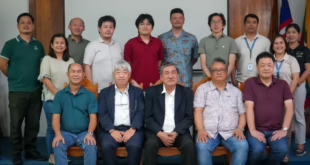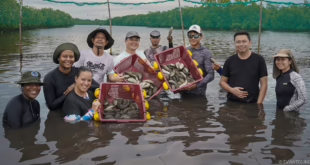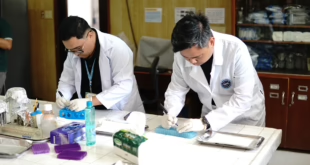By Development Communication Section / R Lacierda / R Bombeo / R Pagador / F Aya / MHS Stinson

The 8th session of the International Training Course on Community-based Freshwater Aquaculture for Rural Areas of Southeast Asia was conducted on 25 November to 04 December 2014 with eighteen international participants from Brazil 1) Brunei Darussalam, (4), Cambodia (1), Indonesia (7), Lao PDR (1), Malaysia (1), Myanmar (1), and the Philippines (2). Six of the participants from the SEAFDEC Member Countries received Government of Japan-Training Fellowship Grants while two participants from Brunei Darussalam and Indonesia were on a cost-sharing scheme. The cost-sharing scheme is offered by SEAFDEC/AQD to SEAFDEC Member Countries wherein the training fee is waived and the participants or their governments pay for their plane tickets and accommodation.
The first 3 sessions of CBFWA were held in Lao PDR starting in 2007, with government extension officers from member countries as participants. The training program has been delegated to SEAFDEC/AQD since 2010 in recognition of its extensive research & development projects on freshwater species and its track record in information & training activities.
This course aims to provide participants with technical knowledge and skills on the broodstock management, spawning, larval rearing and grow-out culture of freshwater fishes, such as bighead carp, tilapia and catfish, and of the giant freshwater prawn. Further, it aims to equip the participants with skills in community organizing. The course should be able to: (1) capacitate aquaculture extension officers on community organizing through a participatory approach, (2) enhance their knowledge and skills on freshwater aquaculture technologies from broodstock development to the seed production, nursery & grow-out phases, and (3) enhance their skills in the transfer & extension services of freshwater aquaculture technologies.
The 10-day course consisted of lecture sessions, practical activities, and field trips. The lectures included an overview of freshwater aquaculture in Southeast Asia, broodstock management, hatchery and grow-out of commercially important freshwater species like tilapia, bighead carp, catfish, and giant freshwater prawn. Lectures on other relevant subjects ranged from aquatic ecology, design and construction of ponds, pens and cages, diseases of freshwater fishes, natural food production, feed formulation and preparation, food safety in aquaculture, genetics for the sustainable management of farmed tilapia, organizing communities for rural aquaculture, preparatory notes for rapid rural appraisal, policies and governance in rural aquaculture, to business planning and management for sustainable small-scale freshwater farm.
Practical activities included sex determination of tilapia, preparation of feed with incorporated male hormone Methyltestosterone for tilapia sex reversal; catfish and carp broodstock selection, hormone preparation and injection for induced spawning, stripping of the eggs, fertilization and incubation. Feed preparation, demo on disease diagnosis, and rapid rural appraisal were also part of the practical activities.
The trainees had a 2-day field trip to the Freshwater Aquaculture Center, College of Fisheries, Central Luzon State University and the Bureau of Fisheries – National Freshwater Fisheries Technology Center in Munoz, Nueva Ecija and a private catfish farm in Sto. Rosario, Pandi, Bulacan.
During the awarding of certificates, Mr. Doanire Kasto Muning, Class Chairman from Malaysia, expressed, on behalf of the group, his heartfelt thanks to all the AQD staff for a successful training despite some unexpected problems. He is hoping that they will share everything they have learned when they go back to their own countries and is looking forward to attending other training courses in the near future. As tokens of appreciation to SEAFDEC/AQD, BFS Officer-in-Charge Dr. Frolan Aya received tourism information materials and seal of Ministry of Marine Affairs and Fisheries from participants of Brunei Darussalam and Indonesia, respectively.




 SEAFDEC/AQD Southeast Asian Fisheries Development Center | Aquaculture Department
SEAFDEC/AQD Southeast Asian Fisheries Development Center | Aquaculture Department



